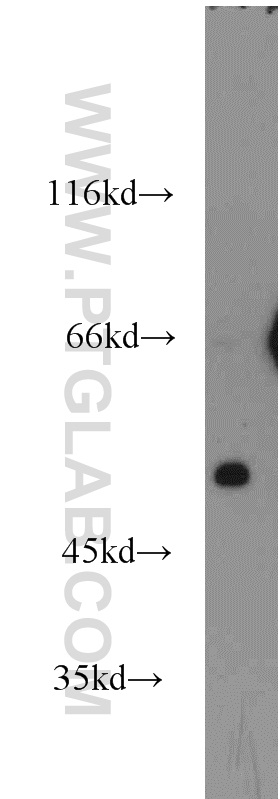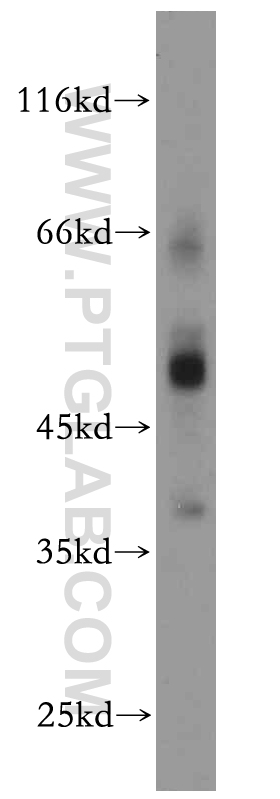验证数据展示
经过测试的应用
| Positive WB detected in | mouse pancreas tissue |
推荐稀释比
| 应用 | 推荐稀释比 |
|---|---|
| Western Blot (WB) | WB : 1:500-1:3000 |
| It is recommended that this reagent should be titrated in each testing system to obtain optimal results. | |
| Sample-dependent, Check data in validation data gallery. | |
发表文章中的应用
| WB | See 1 publications below |
产品信息
14172-1-AP targets SCTR in WB, ELISA applications and shows reactivity with human, mouse, rat samples.
| 经测试应用 | WB, ELISA Application Description |
| 文献引用应用 | WB |
| 经测试反应性 | human, mouse, rat |
| 文献引用反应性 | mouse |
| 免疫原 | SCTR fusion protein Ag5371 种属同源性预测 |
| 宿主/亚型 | Rabbit / IgG |
| 抗体类别 | Polyclonal |
| 产品类型 | Antibody |
| 全称 | SCTR |
| 别名 | SCT R, SCTR, Secretin receptor, SR |
| 计算分子量 | 440 aa, 50 kDa |
| 观测分子量 | 50-55 kDa |
| GenBank蛋白编号 | BC035757 |
| 基因名称 | SCTR |
| Gene ID (NCBI) | 6344 |
| RRID | AB_10642561 |
| 偶联类型 | Unconjugated |
| 形式 | Liquid |
| 纯化方式 | Antigen affinity purification |
| UNIPROT ID | P47872 |
| 储存缓冲液 | PBS with 0.02% sodium azide and 50% glycerol , pH 7.3 |
| 储存条件 | Store at -20°C. Stable for one year after shipment. Aliquoting is unnecessary for -20oC storage. |
背景介绍
SCTR is a member of the family B G protein-coupled receptors. SCTR is a receptor for SCT, a gastrointestinal peptide hormone secreted by the S cells of the duodenum. SCT regulates water homeostasis throughout the body, and influences the environment of the duodenum by regulating SCT in the stomach and pancreas. Studies suggest that SCT can act as a neuropeptide within the central nervous system (CNS), thus SCTR may regulate the function of the CNS.
实验方案
| Product Specific Protocols | |
|---|---|
| WB protocol for SCTR antibody 14172-1-AP | Download protocol |
| Standard Protocols | |
|---|---|
| Click here to view our Standard Protocols |

